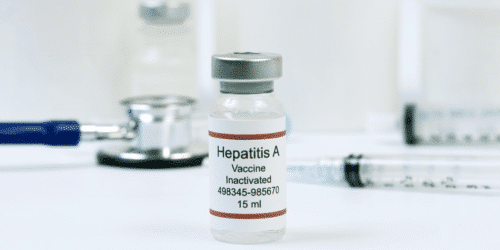HEPATITIS A
WHAT IS HEPATITIS A ?

Among the symptoms of the disease, a fever, fatigue, loss of appetite, nausea, vomiting, stomach pain and yellowing of the skin and of the eyes can be quoted. It is interesting to note that some people don’t show any sign of the disease, while some other experience symptoms for one to six months. In most of the cases, the victims fully recover and the disease don’t cause any serious damage to the liver.
WHAT IS THE RISK FOR TRAVELERS ?
The persons going to developing countries are at high risk for hepatitis A. The disease mostly affects the people visiting rural areas. However, travelers may be infected with hepatitis A when staying in conventional tourist accommodation in urban areas as well.
It is good to note that hepatitis A doesn’t occur in Canada, in Western Europe, in Japan, in New Zealand and in Australia.
HOW TO PREVENT HEPATITIS A ?
Vaccination
If you intend to travel to a country at risk for hepatitis A, you should get vaccinated against the disease before your departure. For optimal protection, two doses of vaccine separated by six months must be administrated. Note that in the United States, the vaccination against hepatitis A is part of the routine vaccinations for children.
Food
It is essential that you always consume safe food, especially while traveling in developing countries. Never eat raw, under cooked or suspicious food and consume it while it is still hot. Avoid buying street food. When eating eggs, prefer them hard-cooked. You should always clean and peel fruits and vegetables before preparing them or eating them. Dairy products must be pasteurized. Avoid eating bush meat, especially monkeys and bats.
Water
Be always sure that the water you drink is safe. Prefer sealed bottled water. If you need to use water from the tap or from a well, you must boil it or disinfect it with a chlorine-based purification product before consuming it.
Hygiene
Have good hygiene practices and frequently wash your hands with clean water and soap, or with an alcohol-based hand sanitizer. Never touch your face, especially your eyes, your nose and your mouth, if you are not sure that your hands are clean. Avoid close contact with other people, such as hugs and kisses, especially with persons looking sick. Avoid sharing eating utensils and cups with other people.
IF YOU THINK THAT YOU MAY BE INFECTED :
If you feel sick after traveling and you think that you may be infected with hepatitis A, consult a doctor as soon as possible and inform him/her of the countries and areas you have visited. To avoid the spread of the disease, you should remain isolated until complete recovery.
We make every effort to ensure that the information posted on our website is up to date and accurate according to the latest public health recommendations; however, it is impossible for us to make changes on a daily basis.
For the most current travel health recommendations, please call our clinic as make an appointment with one of our travel health professionals.
